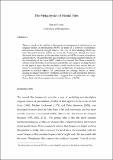The metaphysics of mental files
Abstract
There is much to be said for a diachronic or interpersonal individuation of singular modes of presentation (MOPs) in terms of a criterion of epistemic transparency between thought tokens. This way of individuating MOPs has been discussed recently within the mental files framework, though the issues discussed here arise for all theories that individuate MOPs in terms of relations among tokens. All such theories face objections concerning apparent failures of the transitivity of the ‘same MOP’ relation. For mental files, these transitivity failures most obviously occur because mental files can merge or undergo fission. In this paper I argue that this problem is easily resolved once mental files are properly construed as continuants, whose metaphysics is analogous to that of persons or physical objects. All continuants can undergo fission or fusion, leading to similar transitivity problems, but there are well-established theories of persistence that accommodate this. I suggest that, in particular, the stage theory best suits the purposes of a continuant theory of MOPs.
Citation
Prosser , S 2020 , ' The metaphysics of mental files ' , Philosophy and Phenomenological Research , vol. 100 , no. 3 , pp. 657-676 . https://doi.org/10.1111/phpr.12577
Publication
Philosophy and Phenomenological Research
Status
Peer reviewed
ISSN
0031-8205Type
Journal article
Collections
Items in the St Andrews Research Repository are protected by copyright, with all rights reserved, unless otherwise indicated.

